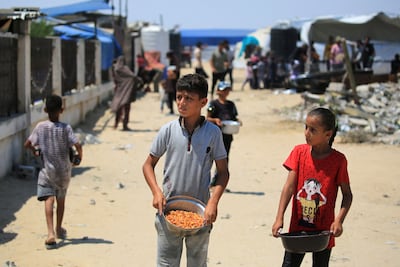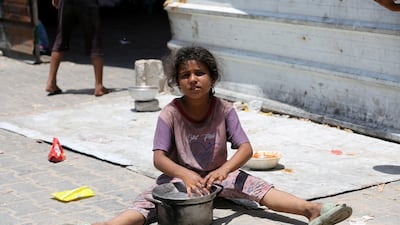Live updates: Follow the latest news on Israel-Gaza
Parents are struggling to feed their children in Gaza, with hundreds being admitted to hospital with malnutrition in the past two weeks, health officials and residents told The National on Tuesday.
Their warning come on the same day the UN warned of "catastrophic" food insecurity in the enclave. It said nearly half a million people in Gaza face “catastrophic levels of acute food insecurity” as aid deliveries dwindle and some are prohibited from entering parts of the besieged strip.
The director of Kamal Adwan Hospital in Beit Lahia in northern Gaza said the number of suffering youngsters arriving at the complex was rising.
Hossam Abu Safia said 214 children had been admitted with malnutrition, at least 50 of whom were "advanced" cases.
Six are in critical condition and are receiving treatment in the intensive care unit, he told The National.
“There is a lack of diverse nutritious foods and the only available food is flour. Additionally, there is a shortage of medicines and medical supplies,” Mr Abu Safia said.
The lack of food had left Palestinians in northern Gaza with weakened immune systems and more susceptible to disease, he added.
“We urgently appeal to all countries worldwide to intervene and pressure Israel to open the crossings and allow the entry of essential supplies to Gaza, northern Gaza, and the rest of the region to save what can be saved,” he said.
Food poisoning and disease
The UN issued its report on famine from the Integrated Food Security Phase Classification (IPC) analysis, conducted from May 27 to June 4. It said about 495,000 people – 22 per cent of the enclave's population – are experiencing the highest level of starvation, known as IPC Phase 5.
The report said 2.15 million people, or 96 per cent of the population of Gaza, will face high levels of acute food insecurity by September.
The displacement of people to areas of Gaza with less water and limited health services "increases the risk of disease outbreaks, which would have catastrophic effects on the nutritional and health status of large segments of the population", the report said.
Mohammed Salah, a resident of Beit Lahia in northern Gaza, told The National his son was poisoned from juice that was distributed to displaced Palestinians.
“Maybe the juice was not stored properly despite being within its expiration date,” said Mr Salah, who is 36 and has six children.
“Other factors could have contributed to the severity of his symptoms, such as the lack of nutrients, iron and vitamins in his body. He was found to have bad anaemia."
Medical sources told The National nearly 60 cases of food poisoning have been reported in northern Gaza due to poor transportation and storage of food items.
Doctors assured Mr Salah many children have come to the hospital daily seeking treatment after experiencing symptoms such as fatigue, dizziness and headaches. This is all due to poor nutrition and the lack of proper living conditions.
“The famine in northern Gaza has reached dangerous levels and things are very difficult. We are almost daily at risk of losing our health,” he said. Many people have lost weight and there is barely any food available, he added.

Struggle to feed children
Mazen Junaid, a 62-year-old from Jabalia refugee camp in northern Gaza, said he spends all his days looking in markets for food to feed his 11 children.
“Everything has been taken from us in this war and we long for what we had during the first days of the famine. Back then, we had some herbs and greens which are known to be beneficial and could sustain us,” Mr Junaid, a former Palestinian Authority employee, told The National.
The market now has only flour and a few canned foods, with no meat, vegetables or fruit available. The available items are extremely expensive for the average Gazan.
“Our stomachs ache from eating canned foods and our bodies are rejecting them because we are not used to this kind of food,” said Mr Junaid.
“People don’t even have money to buy anything due to high prices because their pockets are literally empty. There are no salaries and no one cares about us."
Mr Junaid said his son, Omar, collapsed in the street due to lack of healthy food.
“Everyone, without exception, is suffering from malnutrition due to canned foods,” he said.

